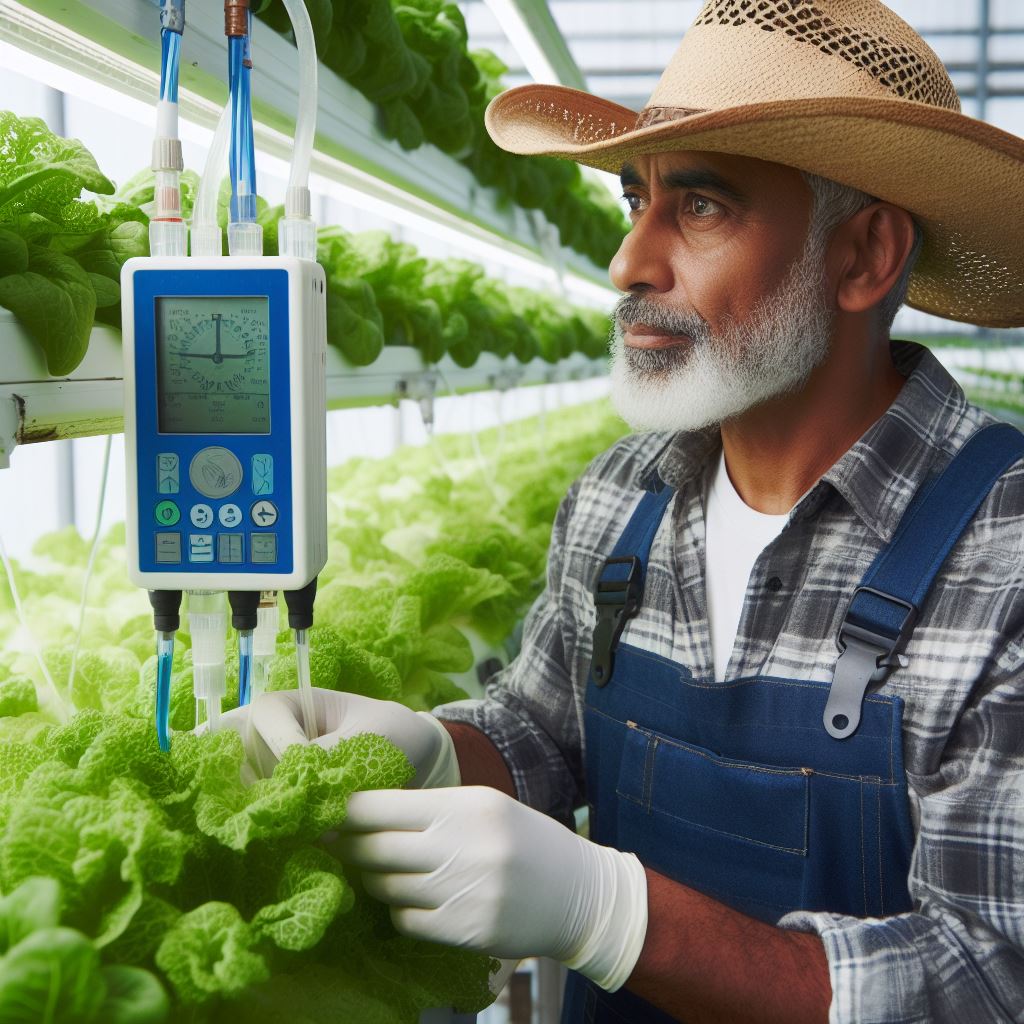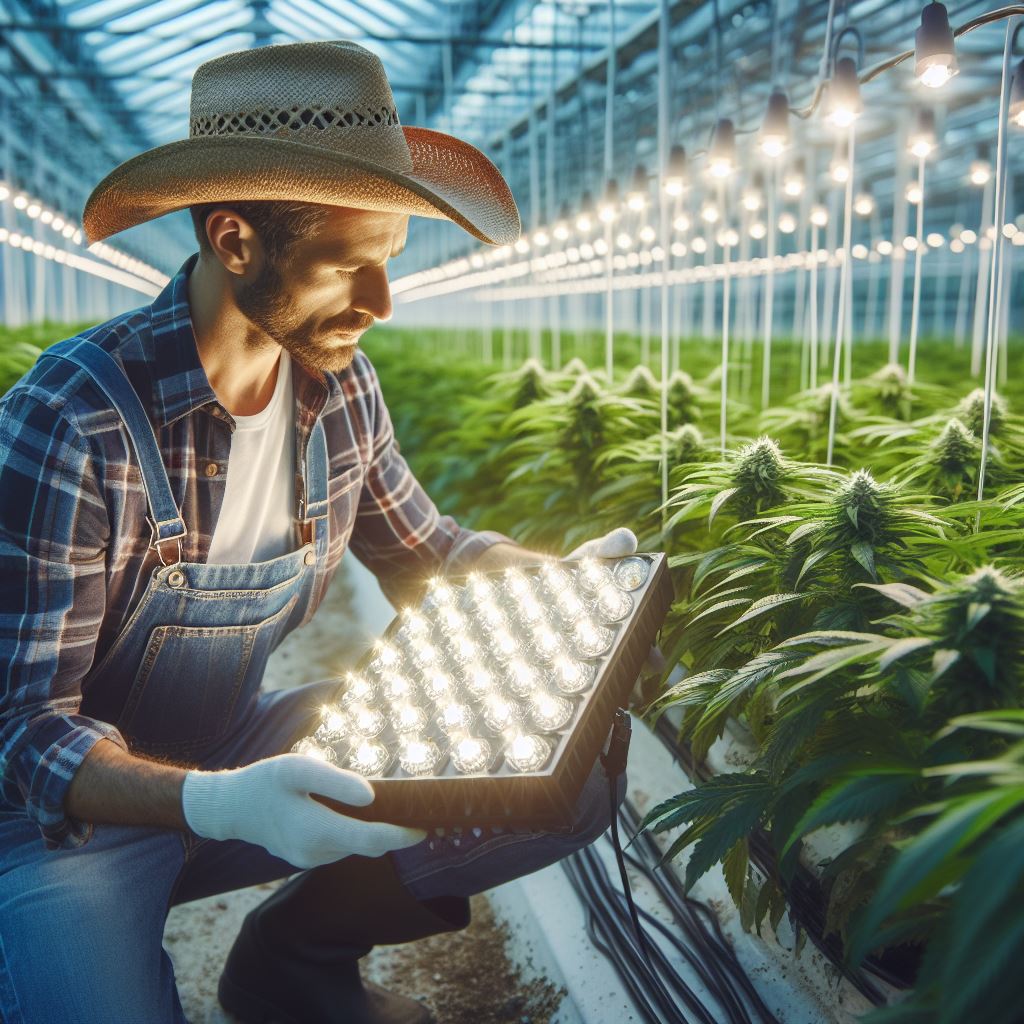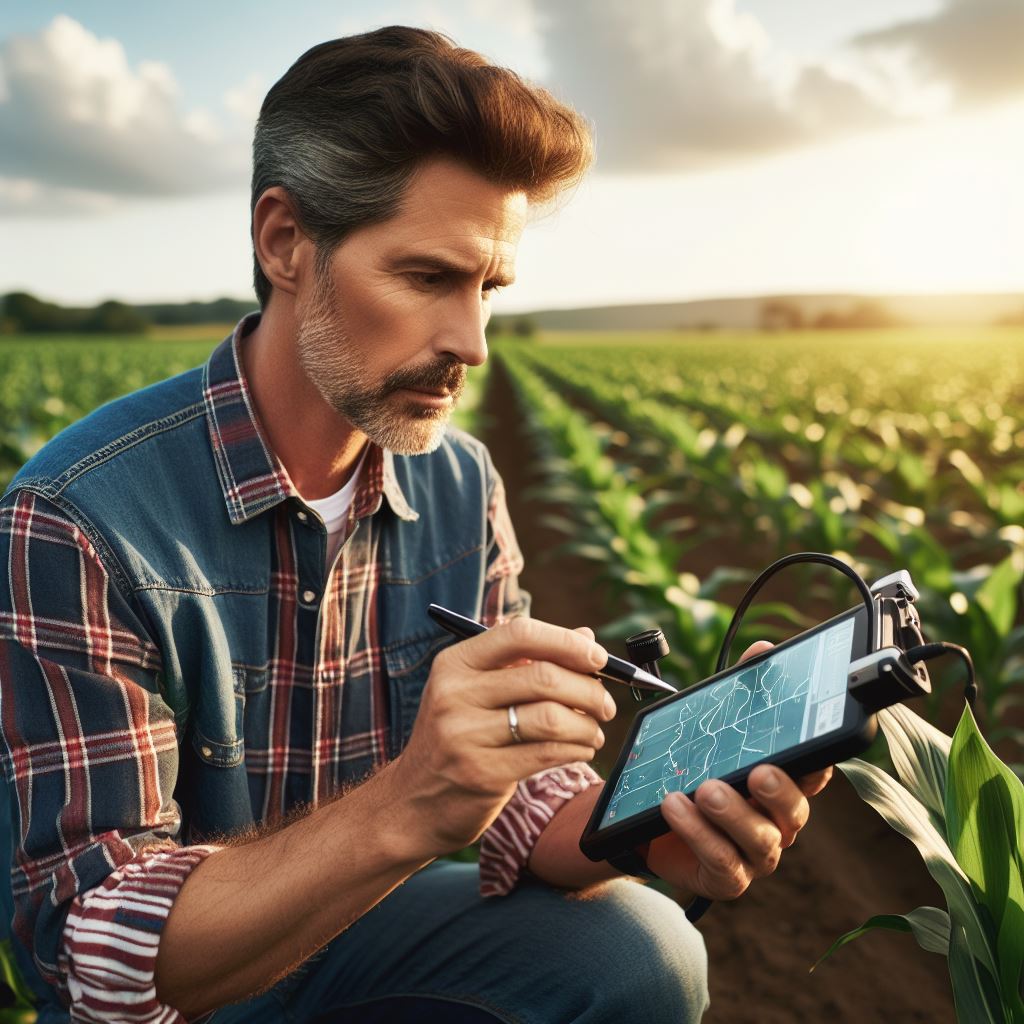Introduction
Importance of water technology in controlled agricultural environments
Water technology is a fundamental aspect of controlled agricultural environments.
In these settings, plants are grown in controlled conditions such as greenhouses or hydroponic systems, where water plays a vital role in ensuring optimal growth and yield.
The importance of water technology in controlled ag environments cannot be overstated.
Water serves as the medium for delivering essential nutrients to plants, making it a critical element for their survival and development.
Through technological advancements, controlled ag environments are designed to efficiently manage and recycle water resources, minimizing wastage and maximizing productivity.
Brief overview of the blog post content
In this blog post, we will explore the various aspects of water technology used in controlled agricultural environments.
Topics covered will include irrigation systems, water quality management, nutrient delivery systems, and water recycling methods.
Understanding these technologies is essential for farmers and researchers aiming to optimize plant growth and resource management.
Additionally, we will discuss the significance of implementing water technology in controlled ag environments.
This includes enhanced crop production, reduced water consumption, and increased sustainability.
By utilizing advanced water technology, farmers can achieve higher yields, better crop quality, and more efficient water usage, contributing to a more environmentally friendly and economically viable agricultural sector.
Stay tuned for the upcoming sections, where we delve deeper into the world of water technology in controlled ag environments, exploring its benefits, challenges, and future prospects.
Types of water technology in controlled ag environments
Water technology plays a crucial role in enhancing agricultural productivity and sustainability in controlled environments.
These innovative systems enable efficient water usage, reduce waste, and maintain optimal growing conditions for crops.
Irrigation systems
Irrigation systems are essential for delivering water accurately and effectively to plants.
Transform Your Agribusiness
Unlock your farm's potential with expert advice tailored to your needs. Get actionable steps that drive real results.
Get StartedAmong the different types, drip irrigation is widely used due to its water-saving benefits.
It ensures water is delivered directly to the plant roots, minimizing evaporation and reducing water loss.
Sprinkler irrigation mimics natural rainfall, while center pivot irrigation offers convenient and automated water distribution through a rotating system.
Water monitoring and management systems
Water monitoring and management systems provide valuable data for effective water utilization.
Sensors and probes measure essential parameters, such as soil moisture and temperature, enabling farmers to make informed irrigation decisions.
Automated irrigation control systems utilize real-time data from sensors to automate watering, enhancing efficiency and optimizing water usage.
Water filtration and treatment systems
Water filtration and treatment systems are vital in maintaining water quality and minimizing contamination risks.
Reverse osmosis is a popular method for removing impurities from water by utilizing a semi-permeable membrane.
Ultraviolet disinfection is an effective technology that uses UV light to kill bacteria and pathogens in water, ensuring its safety for crops and livestock.
Additionally, water recycling systems enable the treatment and reuse of wastewater, conserving water resources and promoting ecological sustainability.
In general, water technology offers significant advantages in controlled agricultural environments.
Through efficient irrigation systems like drip, sprinkler, and center pivot, farmers can optimize water usage while ensuring crops receive adequate moisture.
Water monitoring and management systems, including sensors and automated control, enable precise and data-driven irrigation decisions.
Water filtration and treatment systems, such as reverse osmosis, ultraviolet disinfection, and recycling, ensure water quality, minimize waste, and support sustainable agricultural practices.
By harnessing these technologies, farmers can enhance productivity, conserve resources, and contribute to a more sustainable future for agriculture.
Read: Hydroponics: Water-Smart Farming Future
Benefits of using water technology in controlled ag environments
Efficient water usage
- Water technology allows for precise water distribution, minimizing water wastage.
- Smart irrigation systems optimize water usage based on real-time data and weather conditions.
- Automated water monitoring and control systems ensure water is delivered where and when it is needed.
Prevention of overwatering or underwatering
- Water technology enables farmers to accurately measure and regulate water levels in controlled ag environments.
- Sensors provide data on soil moisture, preventing excessive or insufficient watering.
- This prevents water stress, root rot, and other problems associated with improper water management.
Improved crop yields and quality
- Water technology ensures crops receive optimal hydration, leading to healthier plants and increased yields.
- Precise water delivery aids nutrient absorption, enhancing crop quality and nutritional value.
- Controlled ag environments with proper water management create ideal conditions for crop growth.
Reduction of water contamination and disease spread
- Water technology includes filtration and treatment systems that remove impurities and pathogens.
- This reduces the risk of water contamination, minimizing the spread of diseases among crops.
- Clean water also prevents mineral buildup and clogging in irrigation systems, improving their lifespan.
Sustainability and environmental conservation
- By maximizing water efficiency, water technology helps conserve this valuable natural resource.
- Reducing water usage in agriculture contributes to overall water conservation efforts.
- Using water technology in controlled ag environments supports sustainable farming practices.
- These practices help preserve ecosystems, maintain biodiversity, and minimize environmental impacts.
In essence, incorporating water technology in controlled ag environments offers numerous benefits.
Efficient water usage, prevention of overwatering or underwatering, improved crop yields and quality, reduction of water contamination and disease spread, and sustainability and environmental conservation are among the advantages.
By embracing water technology, farmers can optimize resource utilization, ensure healthier crops, and contribute to a more sustainable and resilient agricultural industry.
Read: Efficient Watering with IoT in Agri
Challenges and Considerations
Initial investment and maintenance costs
The implementation of water technology in controlled agricultural environments requires a significant initial investment.
The cost includes purchasing the necessary equipment, installing the systems, and ensuring their proper functioning.
Technical knowledge and training requirements
Operating water technology in controlled ag environments demands a certain level of technical expertise.
Individuals should be knowledgeable about system components, automation, and maintenance to ensure optimal performance.
Showcase Your Farming Business
Publish your professional farming services profile on our blog for a one-time fee of $200 and reach a dedicated audience of farmers and agribusiness owners.
Publish Your ProfileCompatibility with different crop types and production systems
One of the key challenges in employing water technology is ensuring compatibility with various crop types and production methods.
Different crops have specific water requirements that must be met for optimal growth and yield.
Adapting to varying weather conditions
Controlled ag environments aim to maintain consistent growing conditions, but external weather conditions can be unpredictable.
Water technology systems need to be adaptable to changes in temperature, humidity, and other factors that influence crop growth.
Water resource availability and management
The availability and management of water resources play a crucial role in controlled ag environments.
Efficient water usage, recycling, and monitoring water quality are essential for sustainable and cost-effective operations.
Read: Smart Sensors: Changing Farm Water Use

Case studies and success stories
Example 1: Implementation of automated irrigation control system in a hydroponic greenhouse
In a hydroponic greenhouse, an automated irrigation control system was implemented to optimize water usage.
This system monitored the moisture levels in the plants’ root zone and adjusted the irrigation accordingly.
By using sensors, the system ensured that water was delivered only when needed, preventing overwatering and water wastage.
This resulted in significant water savings and improved crop health.
Example 2: Adoption of water recycling system in a vertical farm
A vertical farm successfully adopted a water recycling system to conserve water resources.
The system collected and treated the runoff water from the hydroponic system, removing any impurities and contaminants.
The treated water was then reused for irrigation, reducing the reliance on fresh water sources.
This sustainable approach not only minimized water consumption but also reduced the farm’s environmental impact.
Example 3: Increased crop yields and water savings through drip irrigation in a controlled ag facility
A controlled agriculture facility achieved higher crop yields and water savings by implementing drip irrigation.
Unlike traditional irrigation methods, which can result in water loss due to evaporation or runoff, drip irrigation delivers water directly to the plant roots in a slow and precise manner.
This optimized water distribution minimized water wastage and ensured that crops received the necessary moisture for healthy growth.
As a result, the facility experienced improved crop yields and reduced water usage, leading to increased sustainability and profitability.
These real-life examples demonstrate the effectiveness of water tech solutions in controlled agriculture environments.
By employing automated irrigation control systems, water recycling systems, and drip irrigation techniques, farmers can significantly improve water efficiency, crop yields, and overall sustainability.
These success stories serve as inspiration for other agricultural facilities to adopt similar water-saving technologies.
In a nutshell, the implementation of water tech in controlled ag environments plays a crucial role in achieving sustainable and efficient agricultural practices.
Case studies and success stories highlight the positive impact of innovative water-saving solutions such as automated irrigation control systems, water recycling systems, and drip irrigation techniques.
By embracing these technologies, farmers can maximize crop yields, minimize water wastage, and contribute to a more sustainable future for agriculture.
Read: Rainwater Harvesting in Agriculture: A Guide
Future trends and advancements in water technology for controlled ag environments
Integration of artificial intelligence and machine learning
Artificial intelligence and machine learning are revolutionizing the way water technology is used in controlled agricultural environments.
By leveraging these advanced technologies, water tech providers are able to optimize irrigation systems and make data-driven decisions.
Smart irrigation systems and real-time data analysis
Smart irrigation systems equipped with sensors and data analytics capabilities have become essential tools for efficient water management in controlled ag environments.
These systems continuously monitor soil moisture levels, weather conditions, and crop water requirements to deliver the precise amount of water needed.
Development of more efficient and sustainable water treatment methods
With increasing concerns about water scarcity and environmental impact, there is a growing need for more efficient and sustainable water treatment methods.
Water technology providers are developing innovative solutions to improve water quality while minimizing chemical usage and energy consumption.
Collaboration between water technology providers and agricultural producers
To effectively address the challenges of water management in controlled ag environments, collaboration between water technology providers and agricultural producers is crucial.
By working together, they can design and implement customized solutions that meet the specific needs of each farm and optimize water usage.
Uncover the Details: Self-Driving Tractors: Farming Made Easy
Conclusion
Investing in water technology is crucial for controlled agricultural environments.
As discussed throughout this post, water is a precious resource that enables crop growth.
New innovations allow growers to use water more efficiently and sustainably.
Growers must adopt water technologies to maximize yields while minimizing water waste.
This post explored various water technologies for controlled agriculture.
Showcase Your Farming Business
Publish your professional farming services profile on our blog for a one-time fee of $200 and reach a dedicated audience of farmers and agribusiness owners.
Publish Your ProfileSensor networks precisely monitor conditions to optimize irrigation.
AI systems analyze data to make predictive watering decisions.
Hydroponics and aeroponics recirculate water for reduced usage.
Greenhouse coverings conserve water evaporation. Smart meters detect leaks.
Water treatment systems enable reuse.
Drip irrigation, low-pressure nozzles, and soil moisture probes deliver water directly to plant roots.
Water tech empowers growers to grow more with less.
Cost savings from reduced water use can offset tech investments.
Water stewardship maintains supply for future generations.
Wise water management also improves crop quality and flavor.
Adopting water tech demonstrates social and environmental responsibility.
The innovations discussed here represent only a sampling of emerging water solutions for agriculture.
This post aimed to inspire readers to further investigate options relevant to their operations.
With water technology, growers can maximize productivity and sustainability.
The time is now to implement water-smart farming practices.




